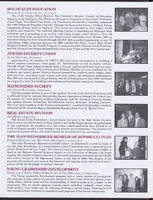Search the Special Collections and Archives Portal
Search Results
Brookman, Eileen
Eileen (Milstein) Brookman (1921-2004) was member of the Nevada Assembly from 1967-1977 and 1987-1990. Small in stature but nicknamed "Queenie" by her admirers, she advocated passionately for the rights of persons with disabilities, minorities, people with low incomes, women, and especially the elderly. Brookman entered state politics in 1962 when she was appointed Indian Commissioner by Governor Grant Sawyer.
Person
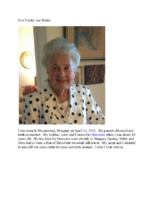
Biographical essay by Eva Weisz Vayda, 2014
Date
Archival Collection
Description
Vayda's essay describes her young-adulthood in Hungary, and being sent to Birkenau camp in 1944, and successive camps afterward. She came to the United States in 1956 with her husband and children.
Text

Biographical essay by Esther Toporek Finder, 2014
Date
Archival Collection
Description
Essays by Esther Finder describe her parents surviving the Holocaust, and her own visit to the town where they grew up in Poland.
Text
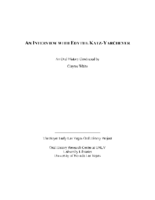
Transcript of interviews with Edythe Katz-Yarchever by Claytee White, 2000-2005
Date
Archival Collection
Description
Transcript of interviews with Edythe Katz-Yarchever by Claytee White over the course of several sessions in 2000, 2003 and 2005. In the interviews, Katz-Yarchever discusses her life in Las Vegas, owning theaters with her husband, Lloyd Katz, and the strides they made in civil rights. She talks about her service in Civil Defense and the National Guard, and moving to various places, then working in California and meeting her husband, Lloyd. The Katzes became involved in the community in various ways with Operation Independence and Holocaust education. About a decade after Lloyd's death, Edythe married Judge Gilbert Yarchever.
Edythe Katz-Yarvhever was born in Boston, a second generation American whose grandparents left Russia the century before. Edythe completed finishing school at the start of World War II and worked various jobs at home before joining the Civil Defense, and later, the National Guard. She moved to Maryland and got a job as a secretary at Edgewood Arsenal, then transferred to Cushing General Hospital to assist a Marine Corps neurologist, who was also a Jewish refugee. Towards the end of the war, she is transferred to an Army hospital in Hawaii, and thus began the rest of her life on the West Coast. When the war ended, Edythe sailed to California and worked various jobs in Los Angeles: in the secretarial pool at MGM Studios, for a casting agency and for a hotel magazine. Edythe met Lloyd Katz in San Francisco, and the two were married after a short courtship. The couple lived in San Francisco before moving to Las Vegas in 1951, where they took over the management of the Huntridge, Palace and Fremont theaters, then leased by Edythe's parents. The Katzes took a stand to desegregate their theaters, allowing black customers to sit with white patrons. Edythe and Lloyd became active in the city's Civil Rights Movement, including work with Operation Independence and the NAACP. Edythe started organizations like Volunteers for Education and Junior Art League, and directed an interfaith, interracial preschool. Lloyd would frequently open up their theaters to organizations to hold fundraisers, free-of-charge. Edythe was extremely active in the local Jewish community, including opening the city's first Jewish gift shop, serving as sisterhood president at her synagogue and starting the Jewish Reporter. She later founded a library for Holocaust education as well as assisted the school district's development of curriculum and teacher training relating to the Holocaust. Lloyd Katz passed away in 1986, and in 1995, Edythe married Gilbert Yarchever. Edythe and Lloyd's community service work was honored with the naming of their school, the Edythe and Lloyd Katz Elementary School, where Edythe still remains active.
Text
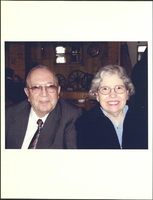
Photograph of Henry and Anita Schuster, circa 2000
Date
Archival Collection
Description
Bust-length photograph of Henry and Anita Schuster.
Image
Edythe and Lloyd Katz Papers
Identifier
Abstract
The Edythe and Lloyd Katz papers (1934-2002) provide a glimpse of the social, religious, and educational contributions they made to the community of Las Vegas, Nevada. Materials include photographs, correspondence, newspaper clippings, and awards dating from 1934 to 2002.
Archival Collection
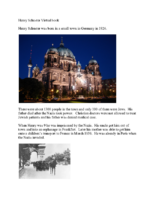
Biographical essay by Henry Schuster, 2014
Date
Archival Collection
Description
This essay describes how Henry Schuster was able to leave Germany through the kindertransport to France in 1939, and arrived in the United States in 1941.
Text
GS - N meeting agendas, working files for events and programs, correspondence, lesson plans and handouts for March of the Living (MOTL) educational programs, correspondence, 2009-2015
Level of Description
Scope and Contents
These digital records from 2009 to 2015 were mainly created by Esther Finder in her work as president of Generations of the Shoah - Nevada. Materials include correspondence, articles and essays, meeting agendas and notes, photographs, drafts of speeches, fliers, informational documents, planning documents for conferences and events, and Holocaust education materials. Also included are emails sent and recieved by Finder, which function as the organization's main method of communication, in lieu of a printed newsletter.
Archival Collection
Collection Name: Generations of the Shoah - Nevada Records
Box/Folder: Digital File 00
Archival Component

